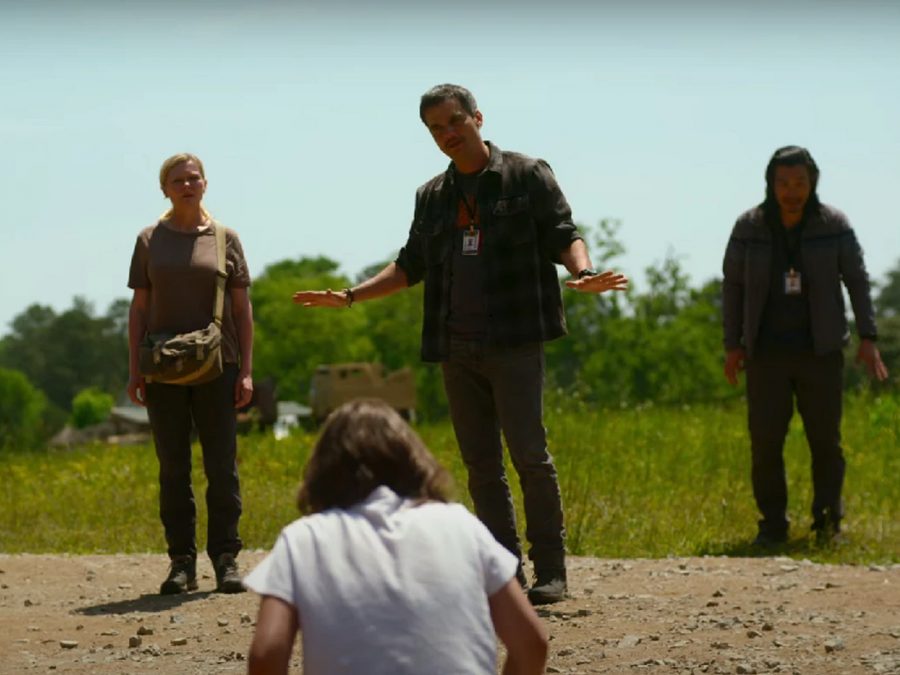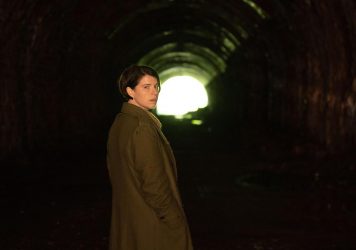Alex Garland's vision of a future America ravaged by conflict is impressively mounted but lacks political bite.
War never changes – at least according to the prologue of Bethesda’s Fallout video game series, set in the aftermath of a nuclear apocalypse in an alternate version of the United States. The wildly successful franchise has spawned five console games and – as of this month – a glossy Amazon drama series, exploring a reality where warring factions eke out a fraught existence across the background of almost total annihilation. This approach is what we have come to expect from imagined depictions of Western warfare, and the series’ three-word tagline implies that despite Fallout’s more fantastical elements (strange creatures, costumed fighters, sentient robots) conflict is the only constant.
The same sentiment could apply to Alex Garland’s Civil War, set in a North America of the near future, where ideological warfare erupting from a presidential insurrection has torn the United States into several camps: the loyalist , the Western Forces, lead by California and Texas; the Florida Alliance consisting of a handful of southern states; the New Peoples’ Army to the north-west, and the Loyalist Forces. Dropping us into the action during the war’s dying days, we learn precious little about the genesis of the conflict and what it is that each of the factions represents. There are snippets of context offered, but Garland (by his own admission) is not particularly interested in the political implications of his story.
Instead Garland’s primary concern is depicting the experiences of a quartet of war correspondents, who set out from New York City to Washington D.C, with the intention of securing an exclusive interview with the despot president (Nick Offerman, pointedly Trumpian without it becoming a distraction) in the war’s dying days. It’s the scoop of the century. Fame and glory await whoever can convince the president to go on record. This appeals more to vivacious reporter Joel (Wagner Mourou) than his taciturn photojournalist partner Lee (Kirsten Dunst), who conceals her world-weary gaze behind the lens of her camera. The pair agree to give a lift to their friend and mentor Sammy (Stephen McKinley Henderson on fine form) who’s keen to get to the heart of the fighting in Charlottesville (of course), and are joined – reluctantly, in Lee’s case – by cub photographer Jessie (Cailee Spaeny) who idolises Lee and wants a chance to prove her metal.
It’s a road movie as much as it’s a war movie, with the group piling into a press van and navigating the desolate highways of the northeast as they pick their way towards the White House. Although there’s no concrete timeline of events to guide us in establishing how long the way has been raging, snippets of information reveal a number of cities have become no-go areas, so the party keep to the backroads, imbued with their own tensions and threats. As members of the press, it doesn’t really matter to the group who’s fighting who – just that they are allowed to bear witness. Their presence has a mixed response; some are indifferent, some are welcoming, and some are hostile. Determining one from the other isn’t straightforward, and the only true allegiance that exists is the one between the four people in their car.

The point that Garland is making is that when you’ve got a gun aimed at you, it doesn’t really matter which side the person holding it is on. He has spoken of his desire to make an anti-war film that cuts across the political divide, and the use of archive footage recorded by right-wing pundit Andy Ngo certainly raises an eyebrow. Given the specificities of political tensions within America, this refusal to really dig into the machinery comes across as cowardly. To gesture at the fractures that put Donald Trump in the White House once (and possibly for a second time come November) but pull your punches in the name of “fairness” validates the racist, misogynistic idealogy which saw terrorists storm the capitol and dismantled Roe v Wade. It is the same weak-stomached middle ground which sees the British and American governments refuse to condemn the genocide of Palestinians because it is not in their political interests. There is no creating a dialogue with a fascist.
And yet, despite its myopic politics, it’s hard to deny that Civil War is an engrossing film. The performances given by the central cast are quite remarkable, with Moura and Dunst operating as foils and McKinley Henderson providing his characteristic brand of steely gravitas (he also delivers one of the film’s best moments). Relative newcomer Spaeny adds to her already impressive CV as a chipper rookie whose eyes are opened in devastating fashion, and the kinship that forms between her and the more familiar trio creates an engaging found-family dynamic. For the always excellent Dunst, it’s another feather in her cap after her heartbreaking turn in Jane Campion’s The Power of the Dog. While Lee’s exhaustion seems bone-deep, born out of ruthless ambition and practicality, Joel’s manic charisma belies a desperation to find purpose in a time of senseless violence.
As a film about the experience of living through a war and particularly war journalism, then, Civil War is much more successful. Its action scenes are earsplitting and sharply violent, shot without the slow motion and strings of more poetic war films. There’s a sense of carnage and chaos, and to hear people talk so disaffectedly about death highlights a pervasive collective glibness that many of us have felt since the dawn of the millennium, but there are still a few moments of such overt cruelty the film maintains its ability to shock.
Garland’s aim, to make a film highlighting that America is tearing itself apart, is a noble, if not naive, one. But when every moment of abject violence seems to be directed at a non-white character, it’s impossible to tell if he is trying to make a point about who suffers the most during conflicts, or if this is a blind spot as a white filmmaker. His reluctance to ascribe any politics to the film suggests the latter, which is disappointing because Civil War perhaps had the potential to be a much angrier and more confronting film (for both sides of the political spectrum). Perhaps war never changes, in the sense that humans seem destined to continually find new and creative ways to tear ourselves apart with the most vulnerable at the front of the firing line, but an attempt to make an apolitical American war film is in itself a political statement (particularly from a British filmmaker). For all the impressive performances and spectacle of Civil War, that’s all it can really be in its mealy-mouthed, dithering conception: an impressively mounted spectacle. A diversion from the fact that we’re way past finding common ground anymore.
Little White Lies is committed to championing great movies and the talented people who make them.
Published 11 Apr 2024
Men was diabolical, but I would walk through fire for Kirsten Dunst.
Not a film one enjoys as much as experiences.
Bracing yet frustratingly timid. McKinley Henderson MVP!

A woman reeling from a personal tragedy embarks on the holiday from hell in Alex Garland’s very British folk horror film.

The emotional divide between human and robot merges in Alex Garland’s throwback sci-fi chamber piece.

Alex Garland delivers a visually stunning, coolly affecting allegory for life, loss and human fallibility.